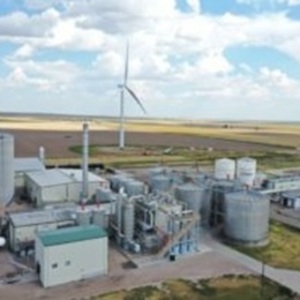Wind turbine installed at Kansas ethanol plant

SOURCE: Faith Technologies Inc.
January 20, 2022
BY Faith Technologies Inc.
Faith Technologies Inc., Juhl Energy, GE Renewable Energy and Western Plains Energy have partnered to install a wind turbine to power the WPE ethanol plant in Oakley, Kansas, with on-site, clean, renewable energy.
FTI is a national leader in engineering, construction, manufacturing and clean energy and was chosen for this project based on its turn-key engineering experience. FTI provided procurement and construction for the wind turbine and collection system at the WPE facility.
Juhl Energy is a leading provider of competitive clean energy solutions and provided project development guidance prior to and throughout construction.
GE is harnessing onshore wind energy potential with a broad family of smart, modular turbines that are uniquely suited for a variety of wind environments, with onshore wind power technology and services that can help improve cost, capacity and performance over the life of a turbine.
Advertisement
WPE produces high-octane fuel from grain products, and currently produces approximately 50 million gallons of denatured ethanol annually. The incorporation of this 2.7 MW wind turbine to power the plant is the first in a series of projects WPE has identified to decarbonize, with an ultimate goal of producing carbon-neutral fuel.
“Every kilowatt-hour that we use from the wind turbine has a direct effect on decarbonizing our production process,” said Derek Peine, general manager of Western Plains Energy. “We are simply replacing higher carbon-based electricity from the utility grid with 100 percent renewable energy. Depending on wind speeds, there are times when we are operating 100 percent off of the utility grid,” he noted. WPE’s goal is to offset 50 percent of the plant’s total electrical load over the course of a year.
“Western Plains Energy is on the leading edge of utilizing clean energy to produce fuel,” said Charlie Fredrickson, vice president of EnTech Solutions (a division of FTI). “Other organizations reach toward their sustainability goals by purchasing offset credits. WPE is directly using wind energy in their production, creating the lowest carbon intensity (CI) fuel possible.”
Advertisement
“WPE is leading by example and is one of the first bio-fuel companies taking real steps to become carbon neutral using distributed renewable energy generation,” said Clay Norrbom, president of Juhl Energy. “We’re proud to help support WPE’s vision and are excited about the prospects for how the renewable electricity and biofuel industries can work together to make a big difference in carbon reduction,” he noted.
“GE’s 2-megawatt wind turbine is the best-selling turbine platform in the country and ideally suited for a project like this, helping to deliver affordable, reliable, sustainable energy for our customers,” said Dan Fesenmeyer, sales director at GE Renewable Energy.
The project was completed and commissioned at the end of November 2021. Additional projects are planned to continue WPE’s quest to better the environment with lower carbon fuel.
Related Stories
The European Commission on July 18 announced its investigation into biodiesel imports from China is now complete and did not confirm the existence of fraud. The commission will take action, however, to address some systemic weaknesses it identified.
Kintetsu World Express Inc. has signed an additional agreement with Hong Kong, China-based Cathay Pacific Airways for the use of sustainable aviation fuel (SAF). The agreement expands a three-year partnership between the two companies.
Broco Energy on July 17 announced a new partnership with the Massachusetts Port Authority (Massport) to deliver and transition Massport's fuel tanks to renewable diesel across its various facilities.
Shell Aviation, Accenture, and Amex GBT on July 10 announced Avelia is in the process of evolving to an industry solution with independent data hosting and a multi-supplier model helping users access the GHG benefits of SAF.
The U.S EPA on July 17 released data showing more than 1.9 billion RINs were generated under the RFS during June, down 11% when compared to the same month of last year. Total RIN generation for the first half of 2025 reached 11.17 billion.
Upcoming Events










